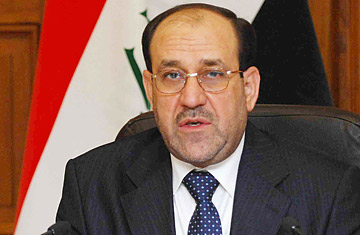
Iraqi Prime Minister Nouri al-Maliki
In a riveting episode of political theater, Iraqi legislators dealt a blow to Prime Minister Nouri al-Maliki on Wednesday when the stony-faced Speaker of the National Assembly postponed a crucial vote on the Status of Forces Agreement with Washington that would send home American troops by the end of 2011.
The vote had originally been slated for Monday, but was rescheduled for 11 a.m. Wednesday, and then pushed back to 3 p.m. Just before 4.30 p.m. the shrill bell calling lawmakers into the assembly chamber shrieked across the stained thin carpeting of the halls of the Parliament building. But senior members of the Sunni Tawafuk bloc refused to enter the session, leaving the Speaker with little choice but to reschedule the vote for Thursday. "We want our demands met, and they have not been," said Omar Abdel-Sattar al-Karboole, a member of Tawafuk, as the bell rang. (See photos of five years of U.S. troops in Iraq)
The Status of Forces Agreement (SOFA) has deeply divided Iraq's political factions. Proponents of the pact, led by Maliki's Shi'ite bloc and its Kurdish allies, emphasize that it reflects the fact that the Iraqi government has forced Washington to accept hard deadlines for U.S. withdrawal from Iraq, and to make other concessions. Nationalist opponents led by firebrand Shi'ite cleric Moqtada al-Sadr reject the agreement in principle, because it gives an Iraqi stamp of approval to the U.S. military presence in Iraq, which is currently authorized by the U.N. Security Council. The Sunni Tawafuk bloc, meanwhile, does not reject the pact in principle, but wants to squeeze more concessions out of Maliki — Tawafuk has demanded a referendum on the security agreement be held next year once it has been adopted by parliament, and more immediately, it seeks amnesty for the (mostly Sunni) detainees in U.S. custody. Under the terms of SOFA, the detainees would be transferred to Baghdad's control at the end of the year, after the U.N mandate covering the U.S mission here expires on Dec. 31.
Maliki and his allies have the numbers to push SOFA through the parliament, but without overwhelming Sunni approval, the agreement would be tainted by its lack of national consensus. And so, the frenetic horse-trading over the security agreement has become a game of brinkmanship. On Wednesday, the prime minister personally lobbied recalcitrant parliamentarians at the nearby Rasheed Hotel, in exchanges that degenerated into fiery rows, according to a Maliki aide who was present.
If the National Assembly rejects the agreement or fails to vote on it, the Iraqis would have to ask the U.N to extend its mandate. Such a request would have to be lodged with the Security Council before Dec. 15, according to Ali al-Adeeb, a parliamentary member of Maliki's Dawa Party. That's an option Maliki has all but ruled out, and is strenuously working to avoid, but the clock is ticking. "The government wasted a lot of time, hundreds of days on this agreement, and left us with less than two weeks to debate it," said al-Karboole. The fate of a deal that took nine months to negotiate may now depend on what happens in the next 24 hours. It's going to be a long night in Baghdad.
